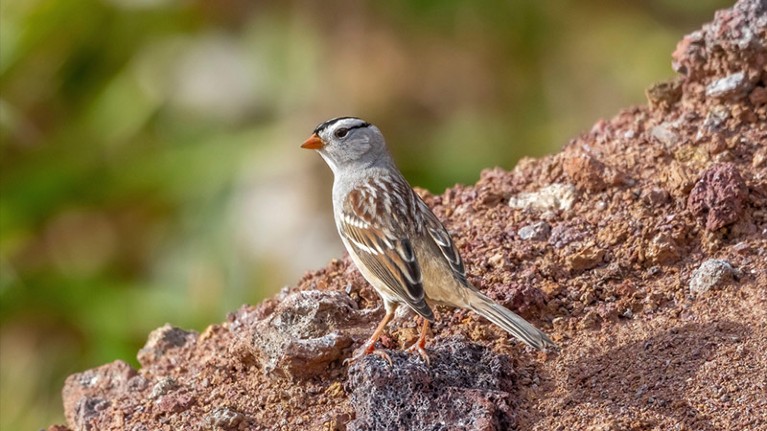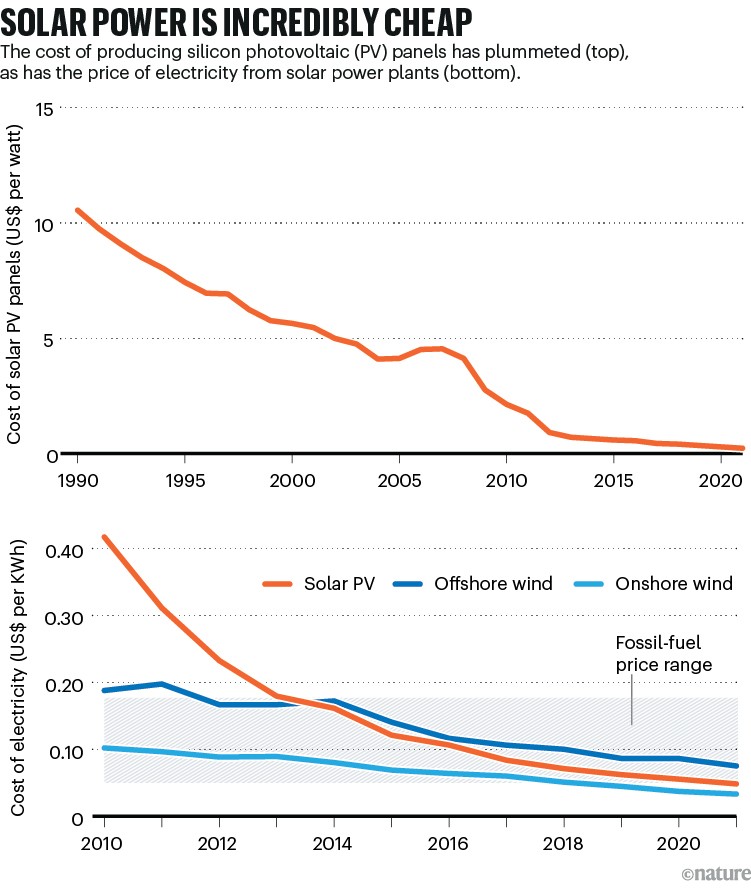Hello Nature readers, would you like to get this Briefing in your inbox free every day? Sign up here.

Gambel’s white-crowned sparrow (Zonotrichia leucophrys gambelii) is native to North America.Credit: blickwinkel/Alamy
When it’s time to find a mate, the parts of songbird brains that are responsible for singing get bigger — and then shrink down again at the end of the season. But none do it quite like the Gambel’s white-crowned sparrow (Zonotrichia leucophrys gambelii). In males of the species, a brain area called the HVC nearly doubles in size, expanding from 100,000 neurons to 170,000. How the bird pulls off this feat is still a mystery — but it might one day point to ways of treating anomalies in the human brain.
Nature | 4 min read
US scientists and engineers with long-term disabilities earn less than their non-disabled peers to the tune of, on average, US$10,580 per year, according to a survey of more than 700,000 people in the United States with PhDs in science, technology, engineering or mathematics (STEM). The sector with the most pronounced gap is academia, with disabled people in STEM roles earning $14,360 less than their non-disabled counterparts. “It’s a wake-up call,” says disability-rights researcher Jay Dolmage.
Nature | 4 min read
Reference: Nature Human Behaviour paper
Australia’s proposal to heavily restrict export of research with potential military use has shocked scientists. The law would require Australian researchers to obtain a permit to collaborate with foreign citizens — even those working in their own facilities in Australia — on technologies such as sea-bed sonar and spacecraft. Failure to do so could result in fines and up to ten years in prison. Cryptographer Vanessa Teague says that this extension of existing permit laws is “large and unjustified”.
Nature | 5 min read
Leaked documents imply that the United Arab Emirates (UAE) is tarnishing its leadership role at the United Nations Climate Change Conference (COP28) by chasing fossil-fuel deals with participants. The briefing documents acquired by the BBC and the Centre for Climate Reporting were written for Sultan al-Jaber, the COP28 president. The documents recommend talking points to raise with global decision makers on behalf of the UAE’s state-run energy companies, Adnoc and Masdar — both of which are headed by al-Jaber. The leak reveals an approach that is “breathtakingly hypocritical”, says climate-policy scholar Michael Jacobs. “The UAE at the moment is the custodian of a United Nations process aimed at reducing global emissions. And yet, in the very same meetings,” he adds, “it’s actually trying to do side deals which will increase global emissions.”
The allegations are “false, not true, incorrect, and not accurate”, responded al-Jabar. “Do you think the UAE, or myself, will need the COP, or the COP presidency, to go and establish business deals?” COP28 opens tomorrow in Dubai.
BBC | 7 min read & CNN | 3 min read
Features & opinion
Table of Contents
The advocacy group 1Day Sooner is pushing for more ‘human challenge’ trials, in which healthy volunteers are deliberately infected with pathogens. There have been challenge trials for COVID, Zika and malaria, and hepatitis C could be next. “Without this, it will be impossible to progress the vaccine field,” says immunologist Ellie Barnes, who hopes to lead a hepatitis study. But some challenge trials “didn’t make as much difference as those people were hoping or expecting”, says bioethicist Seema Shah. She is one of the scientists who worry that the focus on challenge trials could lead to missed opportunities, such as a lack of effort to address gaps in recruitment for normal vaccine studies.
Nature | 13 min read
A first-of-its-kind commitment between China and California shows that effective climate action can happen below the national level, says environmental-policy researcher Fan Dai. The pledge focused on cooperation in cutting greenhouse-gas emissions and transitioning away from fossil fuels. Amid icy US–China relations, cooperation involving sub-national governments could be crucial for a breakthrough on climate, Dai suggests.
Nature | 5 min read
Mesopelagic fish, which inhabit the ‘twilight’ ocean region between depths of roughly 200 and 1,000 metres, make the largest regular migration on the planet. Each day, uncountable individuals — about 90% of all fish, by weight, in the ocean — move from their daytime sanctuary in the deep sea to the surface to feed. This is a key step in the carbon cycle: an enormous amount of plankton is digested and defecated, then sinks to the ocean floor, where it has the potential to be sequestered for centuries in sediments. Scientists are racing to understand just how much carbon these fish are stashing away — before humanity’s insatiable hunger for fish food reaches their twilight world.
Hakai | 15 min read (including some fab photos of outlandish-looking deep-sea denizens)
Infographic of the week

Source: Our World In Data
Economies of scale and technological improvements have cut the cost of a solar panel by about 90% since perovskite solar cells made their debut in 2009. (Nature | 14 min read)
Today I am remembering senior careers editor Karen Kaplan. As an editor, you might not recognize her name — the writers she nurtured are the ones recognized in bylines — but she commissioned many of the stories that I know to be Briefing readers’ favourites. During her 15 years as a journalist at Nature, Karen championed the issues faced by under-represented groups in science, such as the parenting penalties faced by scientist mothers. Her dedication to showing the real-life diversity of scientists drove her to co-develop our award-winning ‘Where I Work’ series. And I will never forget her story about Sampson, a service dog who wears protective equipment when working in the laboratory.
Karen loved language, the blues, bourbon, fashion and seeing her stories loved by Briefing readers, which they often were. Karen died on Sunday, aged 64, of a rare head and neck cancer.
Thanks for reading,
Flora Graham, senior editor, Nature Briefing
With contributions by Gemma Conroy and Katrina Krämer
Want more? Sign up to our other free Nature Briefing newsletters:
• Nature Briefing: Anthropocene — climate change, biodiversity, sustainability and geoengineering
• Nature Briefing: AI & Robotics — 100% written by humans, of course
• Nature Briefing: Cancer — a weekly newsletter written with cancer researchers in mind
• Nature Briefing: Translational Research covers biotechnology, drug discovery and pharma
